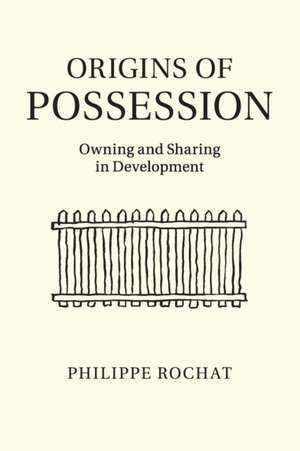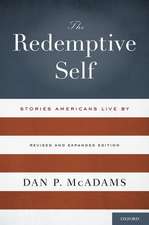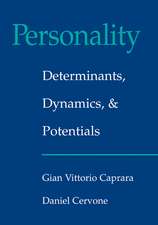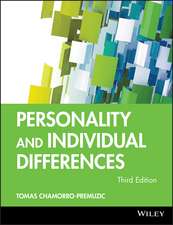Origins of Possession: Owning and Sharing in Development
Autor Philippe Rochaten Limba Engleză Paperback – 16 dec 2015
| Toate formatele și edițiile | Preț | Express |
|---|---|---|
| Paperback (1) | 287.66 lei 6-8 săpt. | |
| Cambridge University Press – 16 dec 2015 | 287.66 lei 6-8 săpt. | |
| Hardback (1) | 727.26 lei 6-8 săpt. | |
| Cambridge University Press – 10 sep 2014 | 727.26 lei 6-8 săpt. |
Preț: 287.66 lei
Nou
Puncte Express: 431
Preț estimativ în valută:
55.04€ • 57.62$ • 45.54£
55.04€ • 57.62$ • 45.54£
Carte tipărită la comandă
Livrare economică 05-19 aprilie
Preluare comenzi: 021 569.72.76
Specificații
ISBN-13: 9781316502815
ISBN-10: 1316502813
Pagini: 336
Ilustrații: 2 tables
Dimensiuni: 153 x 230 x 20 mm
Greutate: 0.45 kg
Editura: Cambridge University Press
Colecția Cambridge University Press
Locul publicării:Cambridge, United Kingdom
ISBN-10: 1316502813
Pagini: 336
Ilustrații: 2 tables
Dimensiuni: 153 x 230 x 20 mm
Greutate: 0.45 kg
Editura: Cambridge University Press
Colecția Cambridge University Press
Locul publicării:Cambridge, United Kingdom
Cuprins
Introduction: making sense of human possession; Part I. Psychology: Principles of Human Possession: 1. Experiencing possession; 2. Claiming ownership; 3. Possession and ownership transfer; 4. Symbolic spinoffs of possession; Part II. Development: Human Ontogeny of Possession: 5. First possession; 6. Ownership in development; 7. Sharing in development; Part III. Culture: Human Possession in Context: 8. Culture and possession; 9. Possession in children across cultures; Conclusion: great transformation.
Recenzii
'Throughout his work, Philippe Rochat attempts to identify what is uniquely human. In this book he yet again moves one step closer to a truly intellectually satisfying description. Origins of Possession is essential reading for all those of us who are in the profession of working with the human mind, particularly when it is troubled and is at risk of losing its essential qualities of self-awareness and symbolization. It is a highly significant contribution which builds on Rochat's unparalleled depth of understanding of child development to deliver a view of the nature and experience of possession that transcends development and individual differences - and illuminates both - whilst striking very close to what lies at the core of our experience of ourselves and of others as sentient beings.' Peter Fonagy, Freud Memorial Professor of Psychoanalysis and Head, Research Department of Clinical, Educational and Health Psychology, University College London
'This is a rare, unique, and exciting book that could not have been written except by a scientist who, like Darwin, has travelled to diverse places and made the insightful observations that open a new perspective on everything of concern to human psychology. Rochat probes a concept so central and pervasive that it is commonplace: possession. He develops a psychology that penetrates deeply into philosophical and ethical realms, and that raises questions that to my knowledge have not been raised before about issues relevant to the development of the most important aspects of social life, issues that pertain to something so basic that it drives sex and violence and has the potential to realign our understanding of economics, law and social formation, as well as individual existence.' Shaun Gallagher, Lillian and Morrie Moss Professor of Excellence, University of Memphis
'Philippe Rochat has been studying children across cultures with a unique combination of curiosity, empathy, and insight. This important book challenges our understanding of their psychology - and of human psychology generally - and opens new directions of research. A highly pleasurable and stimulating read!' Dan Sperber, author of Explaining Culture, and co-author of Meaning and Relevance
'One might think that the topic of possession is clearly delimited and somewhat specialized. In this masterful work Rochat shows that nothing could be farther from the truth. Possession, as Rochat conceives it, is an integral part of all of the most important aspects of human experience. A most enlightening piece of work - and a joy to read.' Michael Tomasello, Co-Director, Max Planck Institute for Evolutionary Anthropology
'Relying on Rousseau's 'Second Discourse', Rochat shows how the idea of property led humans to abandon a natural state of sharing with all other animals to a state in which claims of ownership, combined with the acceptance of such claims by others, set a new standard for civil society based on possession. Rochat creates a fascinating discourse by integrating ideas from philosophy, biology, sociology, and anthropology to understand the development of laws of property in Western and non-Western cultures and the impact of these cultural systems on the psychological development of a sense of possession across the life span … Summing up: highly recommended. Upper-division undergraduates through faculty and professionals.' R. B. Stewart, Jr, Choice
'This is a rare, unique, and exciting book that could not have been written except by a scientist who, like Darwin, has travelled to diverse places and made the insightful observations that open a new perspective on everything of concern to human psychology. Rochat probes a concept so central and pervasive that it is commonplace: possession. He develops a psychology that penetrates deeply into philosophical and ethical realms, and that raises questions that to my knowledge have not been raised before about issues relevant to the development of the most important aspects of social life, issues that pertain to something so basic that it drives sex and violence and has the potential to realign our understanding of economics, law and social formation, as well as individual existence.' Shaun Gallagher, Lillian and Morrie Moss Professor of Excellence, University of Memphis
'Philippe Rochat has been studying children across cultures with a unique combination of curiosity, empathy, and insight. This important book challenges our understanding of their psychology - and of human psychology generally - and opens new directions of research. A highly pleasurable and stimulating read!' Dan Sperber, author of Explaining Culture, and co-author of Meaning and Relevance
'One might think that the topic of possession is clearly delimited and somewhat specialized. In this masterful work Rochat shows that nothing could be farther from the truth. Possession, as Rochat conceives it, is an integral part of all of the most important aspects of human experience. A most enlightening piece of work - and a joy to read.' Michael Tomasello, Co-Director, Max Planck Institute for Evolutionary Anthropology
'Relying on Rousseau's 'Second Discourse', Rochat shows how the idea of property led humans to abandon a natural state of sharing with all other animals to a state in which claims of ownership, combined with the acceptance of such claims by others, set a new standard for civil society based on possession. Rochat creates a fascinating discourse by integrating ideas from philosophy, biology, sociology, and anthropology to understand the development of laws of property in Western and non-Western cultures and the impact of these cultural systems on the psychological development of a sense of possession across the life span … Summing up: highly recommended. Upper-division undergraduates through faculty and professionals.' R. B. Stewart, Jr, Choice
Notă biografică
Descriere
This book studies the psychology surrounding the development of owning and sharing in humans across different cultures.









